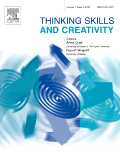
Thinking Skills and Creativity
Scope & Guideline
Advancing Creativity and Critical Thinking in Education
Introduction
Aims and Scopes
- Critical Thinking Development:
The journal explores various methodologies for enhancing critical thinking skills in diverse educational settings, including K-12 and higher education. - Creativity in Education:
It examines the role of creativity in educational frameworks, specifically how creative thinking can be nurtured through innovative pedagogical approaches. - Interdisciplinary Approaches:
Research often integrates insights from different fields, such as psychology, education, and cognitive science, to provide a holistic understanding of thinking skills. - Technology Integration:
The use of technology in promoting critical and creative thinking is a recurring theme, reflecting the impact of digital tools on learning outcomes. - Assessment and Measurement:
The journal emphasizes the development and validation of tools and frameworks for assessing thinking skills, aiding educators in evaluating student performance effectively.
Trending and Emerging
- AI and Digital Learning Tools:
Recent publications focus on the impact of artificial intelligence and digital tools, such as ChatGPT, on fostering critical thinking and creativity in learners. - Social-Emotional Learning:
There is an increasing emphasis on the interplay between creativity, critical thinking, and social-emotional factors, highlighting the importance of emotional intelligence in educational contexts. - Gamification and Engagement:
The integration of gamified learning experiences to enhance student engagement and motivation in developing critical and creative thinking skills is a growing area of interest. - Collaborative Learning Environments:
Research exploring collaborative models of learning, particularly in interdisciplinary settings, has become more prevalent, reflecting the importance of teamwork in creative processes. - Mindfulness and Well-Being:
Emerging studies are investigating the connections between mindfulness practices and enhanced creativity, suggesting that well-being is crucial for fostering innovative thinking.
Declining or Waning
- Traditional Pedagogical Methods:
There is a noticeable decrease in papers discussing traditional teaching methods, as the focus shifts toward innovative and technology-enhanced strategies. - General Creativity without Contextual Focus:
Research that addresses creativity in a broad sense without specific applications or contexts has become less frequent, indicating a move towards more targeted studies. - Static Assessment Techniques:
The use of outdated or conventional assessment methods for measuring creativity and critical thinking has waned, with a growing preference for dynamic and formative assessment approaches.
Similar Journals
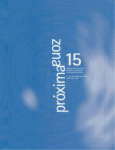
Zona Proxima
Advancing Interdisciplinary Insights for a Global AudienceZona Proxima is a distinguished scholarly journal published by UNIV NORTE, EDICIONES UNINORTE, focusing on interdisciplinary studies relevant to social sciences and humanities. With an ISSN of 1657-2416 and an E-ISSN of 2145-9444, this journal serves as a pivotal platform for researchers, professionals, and students to disseminate their findings and contribute to ongoing discussions within these fields. Situated in Barranquilla, Colombia, Zona Proxima aims to promote academic excellence and innovation by publishing high-quality research that reflects diverse perspectives and methodologies. Although currently not listed as Open Access, the journal strives to make knowledge accessible and impactful, playing a vital role in advancing scholarship in Latin America and beyond. Researchers are encouraged to submit their work to join in cultivating a vibrant academic community dedicated to exploration and discourse.
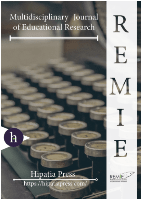
REMIE-Multidisciplinary Journal of Educational Research
Cultivating knowledge and collaboration across educational fields.REMIE-Multidisciplinary Journal of Educational Research, published by HIPATIA PRESS, is a prominent Open Access journal dedicated to advancing the field of educational research. Established in 2011 and based in Barcelona, Spain, this journal provides a platform for diverse scholarly articles that span various disciplines including education, psychology, sociology, and political science. The journal's impact is reflected in its impressive rankings: it is currently positioned in the Q3 category in Developmental and Educational Psychology, Q2 in Education, and Q1 in Sociology and Political Science as of 2023, underscoring its critical role in fostering interdisciplinary dialogue and innovation. With a commendable standing in Scopus rankings—ranking #103 in Sociology and Political Science, #163 in Education, and #59 in Developmental and Educational Psychology—REMIE is a vital resource for researchers, educators, and practitioners seeking to stay abreast of contemporary issues and methodologies in the educational landscape. Emphasizing accessibility and wide dissemination of knowledge, the journal invites contributions that address pressing educational challenges and promote transformative practices.
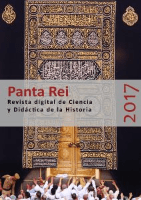
Panta Rei-Digital Journal of History and Didactics of History
Unveiling the past, enriching the present.Panta Rei-Digital Journal of History and Didactics of History, published by CEPOAT-CENTRO EST PROXIMO ORIENTE & ANTIGUEDAD TARDIA, is an esteemed Open Access journal based in Spain, dedicated to advancing the study and teaching of history. With an ISSN of 1136-2464 and an E-ISSN of 2386-8864, this journal has been committed to providing free access to quality research since its inception in 1995. It covers a wide array of topics in history, anthropology, and archaeology, making it a valuable resource for academics and educators alike. The journal is recognized with impressive rankings, including being in the top 89th percentile in History and the 78th percentile in Archaeology, reflecting its significant contributions to these fields. With converging years from 2019 to 2024, Panta Rei aims to foster scholarly dialogues and disseminate innovative didactic methodologies. This journal plays a crucial role in linking theoretical research with practical teaching applications, ensuring that researchers, professionals, and students stay at the forefront of historical scholarship and pedagogy.
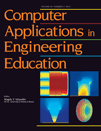
COMPUTER APPLICATIONS IN ENGINEERING EDUCATION
Fostering excellence in engineering education with digital tools.COMPUTER APPLICATIONS IN ENGINEERING EDUCATION, published by Wiley, is a leading journal dedicated to the intersection of computer science and engineering education. With its ISSN 1061-3773 and E-ISSN 1099-0542, this journal has become a vital resource since its inception in 1992, providing valuable insights and advancements within its scope. Renowned for its high impact, the journal is categorized in the Q1 in Education and Q1 in Engineering (miscellaneous) quartiles, reflecting its significant contribution to the fields of education and engineering. The journal holds impressive Scopus rankings, including Rank #41 in General Engineering and Rank #38 in General Computer Science, positioning itself within the top echelons of relevant academic disciplines. Although it is not currently an open-access publication, it provides researchers, educators, and students with a platform to explore innovative computer applications in engineering contexts. This journal not only serves as a repository of knowledge but also fosters a community for professionals interested in enhancing educational methodologies through technology.
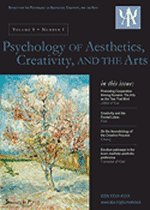
Psychology of Aesthetics Creativity and the Arts
Celebrating the Synergy of Psychology and Artistic EndeavorsPsychology of Aesthetics, Creativity, and the Arts, published by the Educational Publishing Foundation of the American Psychological Association, stands at the forefront of interdisciplinary research, bridging the fields of psychology and the arts. With an ISSN of 1931-3896 and an E-ISSN of 1931-390X, this journal has earned impressive recognition, achieving a 2023 Q1 ranking in Visual Arts and Performing Arts, and placing within the top quartiles for Applied Psychology and Developmental and Educational Psychology. This demonstrates its pivotal role in advancing knowledge about the psychological underpinnings of creativity and aesthetic experience. As a vital platform for researchers, professionals, and students, it offers insights that enhance our understanding of how aesthetic and creative processes impact human behavior and culture. The journal covers a broad range of topics, from artistic expression to cognitive processes related to creativity, making it an essential resource for those invested in the psychological dimensions of artistic endeavors. Although it is not open access, it remains a highly cited resource in its domains, fostering scholarly dialogue and innovation.
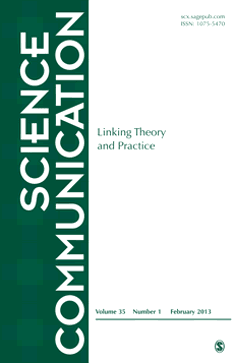
SCIENCE COMMUNICATION
Empowering Voices: Transforming Scientific DiscourseSCIENCE COMMUNICATION is a premier journal that has established itself as a vital platform for the exploration of the intersection between science, society, and communication practices. Published by SAGE Publications Inc, this journal boasts a commendable impact within the field, evidenced by its 2023 ranking as Q1 in Sociology and Political Science, placing it in the top percentile of its category. With an impressive Scopus rank of 14 out of 1466 in the social sciences domain, it serves as an essential resource for researchers, professionals, and students dedicated to understanding how scientific information is communicated and perceived across various platforms and audiences. Spanning a rich publication history from 1979 to 2024, SCIENCE COMMUNICATION publishes original research, case studies, and reviews that contribute to the development of effective communication strategies in science. Although the journal does not currently offer open access options, its content remains pivotal for fostering informed discourse within academia and beyond. Engaging with this journal is invaluable for anyone interested in enhancing science literacy and engagement in contemporary issues.

Teaching Statistics
Cultivating Knowledge, Inspiring Educators in Statistics.Teaching Statistics is a peer-reviewed journal published by Wiley, dedicated to the advancement of statistical education and pedagogical methodologies. With its ISSN 0141-982X and E-ISSN 1467-9639, this esteemed journal has been an integral resource since its inception in 1979, providing a platform for innovative research and practices aimed at enhancing teaching effectiveness in statistics across various educational levels. Housed in the United States, it maintains a significant global presence and engagement, evidenced by its Q3 quartile rankings in both the Education and Statistics and Probability categories as of 2023. Furthermore, it holds commendable Scopus rankings, reflecting its influence in the fields of Mathematics and Social Sciences. Although not an Open Access journal, it fosters a wealth of knowledge beneficial to researchers, educators, and students alike, striving to elevate the standards of statistics education through comprehensive discussions and analyses. Through its commitment to the dissemination of valuable insights and resources, Teaching Statistics continues to be a vital asset for academic and professional communities seeking to enhance statistical learning and teaching methodologies.

EARI-Educacion Artistica-Revista de Investigacion
Transforming Education Through Artistic InquiryEARI-Educacion Artistica-Revista de Investigacion is a distinguished peer-reviewed journal that explores the intersection of art and education, published by the University of Valencia's Department of Prehistory and Archaeology. With its commitment to advancing knowledge in artistic education, the journal serves as a pivotal platform for scholars, educators, and practitioners to share innovative research and transformative practices in the field. Since embracing an Open Access model in 2011, EARI has facilitated broader dissemination of research findings, ensuring that the insights and contributions of its authors reach a global audience. While specific ranking metrics such as HIndex and Scopus ranks are not provided, the journal remains recognized for its scholarly rigor and relevance within the arts education community. Researchers, professionals, and students looking to stay at the forefront of artistic education will find EARI an invaluable resource for contemporary discussions, methodologies, and pedagogical approaches in the discipline.
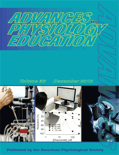
ADVANCES IN PHYSIOLOGY EDUCATION
Advancing the Future of Physiology EducationADVANCES IN PHYSIOLOGY EDUCATION, published by the American Physiological Society, is a leading journal dedicated to the field of physiology education, with a commitment to advancing teaching practices and pedagogical strategies in this vital discipline. Established in 1998, the journal has consistently provided a platform for original research and discussion, fostering the improvement of educational methodologies. With an impressive impact factor and ranked in Q2 for Education and Q3 for Physiology, it reflects a robust academic influence within the research community. The journal ranks #458 out of 1543 in Social Sciences - Education and #130 out of 193 in Biochemistry, Genetics, and Molecular Biology - Physiology according to Scopus, highlighting its critical role in shaping physiology education. While it operates on a subscription model, its focus remains on promoting innovative education practices that benefit both educators and students alike. This journal is essential reading for anyone looking to enhance their understanding of physiology teaching and learning.

Jurnal Penelitian dan Pembelajaran IPA
Connecting Researchers and Educators for Impactful LearningJurnal Penelitian dan Pembelajaran IPA, with ISSN 2477-1422 and E-ISSN 2477-2038, is a leading open-access journal published by the University Sultan Ageng Tirtayasa under the Faculty of Teacher Training & Education (FKIP). Launched in 2015, this journal plays a pivotal role in advancing the field of science education, providing a platform for researchers, educators, and students to share innovative research findings and pedagogical practices. Located in Serang, Banten, Indonesia, the journal aims to bridge the gap between academia and practical application in the science education sector, ensuring that knowledge is accessible to all. With its commitment to quality and transparency, Jurnal Penelitian dan Pembelajaran IPA is dedicated to contributing to the development of effective teaching strategies and enhancing research methodologies in science education, thus influencing future generations of learners.